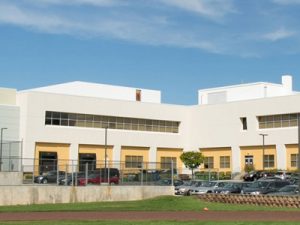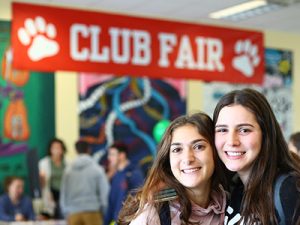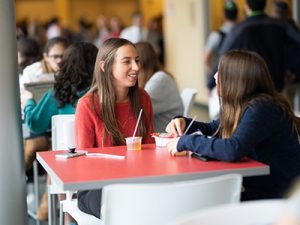Shiriyah: A Perspective from Alum Corey Berman ’15
January 18, 2016
This article appeared on The Times of Israel.
 Something special is happening this week. The opportunity of a lifetime is being offered, a one-of-a-kind opportunity, a level of excitement that only the select few will get to experience.
Something special is happening this week. The opportunity of a lifetime is being offered, a one-of-a-kind opportunity, a level of excitement that only the select few will get to experience.
What I’m talking about, of course, is Shiriyah at The Frisch School.
Let me explain.
Often in Modern Orthodox Jewish education, a heavy focus is placed on teaching information, to the exclusion of teaching to students’ hearts and souls. Teachers usually get up in front of the classroom and give over information: Biblical verses, commentators’ interpretations, halakhic regulations, and vocabulary. More rare are opportunities to focus on the heart, to try to make texts meaningful and relevant. And scarcely (if ever) are the two done at the same time. Rav Kook, however, writes that we need education of the heart in conjunction with education of the intellect. Without both aspects, we risk only getting halfway to the goal, never becoming the whole individual of our potential.
Enter Shiriyah. Trying to describe Shiriyah to somebody outside the Frisch universe is a struggle every Frisch student is accustomed to. Here is my attempt.
Shiriyah is a weeklong mega-event at The Frisch School, built around a central theme that ties into the Judaic studies curriculum of that year. Each grade is a team and receives a component of the overall theme as their team name. Two years ago, for instance, the teams were Holiness of Man (Freshmen), Holiness of the Temple (Sophomores), Holiness of Time (Juniors), and Holiness of the Land (Seniors). The excitement of Shiriyah begins weeks prior, as anticipation grows and teachers insist they do not know when Shiriyah will be, despite every student knowing. Finally, on a Friday morning the entire school is called to the auditorium for the famous breakout video featuring anything from teachers walking around New York City in the cougar mascot costume or performing a music video parodying the Maccabeats or Adele or ‘What Does the Fox Say.’ After each grade’s captains and generals are announced, the work begins.
From that afternoon through the following Thursday, each grade has a list of tasks it must complete. There are the fast song and slow song, banner, 4-way mural painted by each grade on a wall of the school, video, stop-motion video, stomp, Torah bowl, Family Feud, Minute To Win It, Project Runway, Cake Boss, and tons of entrepreneurship for charity. The biggest endeavor by far is the hallway; each grade takes their hallway and transforms it into an interactive exhibit on their grade’s theme. The hallway requires momentous effort in searching Judaic sources for fitting ideas and Hebrew quotes, painting and coloring, cutting and pasting, and writing a skit to go along with the presentation. By the end of the week the hallways are totally transformed from top to bottom, covered with text and multi-media art.
The most important part of Shiriyah, however, is the teamwork and collaboration that is involved. Shiriyah brings the grades together like nothing else could. Students work in groups to help the grade effort. Teachers stay extra hours and walk the halls looking to advise students or help them to get involved.
On Thursday night, literally thousands of parents, grandparents, and friends pack into the gym to watch the presentations and listen to the songs. It is by far Frisch’s biggest event of the year, and has basically taken on a life of its own. Principal Rabbi Ciner has, for years, run the program and has made it what it is today. Shiriyah has its own mini-theme song, and students and teachers refer to it as if it were their own personal Shabbat Queen; they say things like “She’s coming,” “She’s here,” “Shiriyah Shalom,” “Shiriyah loves you.” And, of course, as Rabbi Ciner likes to say: “Shiriyah doesn’t like scores- but we do.” It’s true- Shiriyah is in theory a competition, but the scores almost always fall out in grade order, with the seniors earning their right of passage and winning Shiriyah.
The concept alone is exciting, but in my opinion the most meaningful parts of Shiriyah are the following ‘Big Three.’
(1) Breakout. The enthusiasm and excitement in the school is tangible on that Friday morning. Each grade is screaming their grade chant (“Soph-what? Soph-mores!” et cetera) and everyone is cheering as the breakout video plays, so much so that Rabbi Ciner has to repeatedly ask everyone to “sit down so the freshmen can see!” When the word SHIRIYAH appears on screen the excitement turns to pandemonium, and as the faces of the generals and captains pop up everyone is cheering and hugging their friends who are chosen. What is so amazing about this is that in every grade there are only six or seven students who are chosen, but hundreds more who cheer them on. It is truly as though we have all won the lottery. The excitement everyone shows for each other is something I have rarely seen elsewhere.
(2) The Wednesday night push. During the whole week it seems as though there is an impossible amount to get done. After spending Saturday night planning, all day on Sunday in school, and staying late during the week until 10:00 or 11:00 at night to work on Shiriyah, Wednesday night is when things finally come together. Sitting on the floor in the back of the cafeteria (which has been turned into an art studio/Shiriyah workshop) at 1:00 in the morning so that the hallway will have perfectly cut-out shapes or letters, or sitting huddled in a teacher’s office putting the finishing touches on the video, or painting the last strokes on the gigantic mural- it is the most tiring and most rewarding night of the year. Not to mention the fact that all of this is done alongside members of the grade that maybe you had never hung out with before or never thought you had much in common with.
(3) The final moments. After the four grades have sung their songs, presented their banners and stomps, and the senior choir has sung a medley of their four years of songs, the entire school dances and then finds itself sitting on the floor of the gym, arm in arm, singing Tov Lehodot, Esa Einai, and Acheinu, with Rabbi Ciner in the center. The scores have not been announced yet, but that moment right there is everything.
The famous mishna in Avot teaches that the world stands on three pillars: Torah, Avodah, and Gemilut Chassadim (Torah, Divine service, and acts of kindness). These three pillars represent the best of the world, and also the best of Shiriyah. Shiriyah breakout representsGemilut Chassadim: the kindness and enthusiasm shown for one another during the announcing of captains and generals, and the excitement everyone has at the prospect of spending the week collaborating. Wednesday night of Shiriyah is the Avodah portion: seemingly endless hours of hard work have already passed, and there is still so much to do, but everyone has the same energy and passion as they did on Friday morning. During Shiriyah everyone works, and works, and works some more, not because they have to but because they sincerely want to. All of it is in the name of creating a meaningful execution of the theme, applying the Jewish texts and fleshing out the lessons and teachings. And lastly, the culmination of Shiriyah represents the eternal value of Torah. Everyone in the room feels so connected to the values learned that week, everyone has in his or her own way interacted with the texts and brought them to life, and everyone has learned key teamwork and leadership skills along the way. There could be no more worthy endeavor.
Over the fast-paced week of Shiriyah, every one of us has won the lottery. During breakout, we have won the lottery because our friends are everything to us, and their victory is our victory. Late Wednesday night, we have won the lottery because there is literally no place on Earth we would rather be. The 90’s TV show Boy Meets World has an amazing quote: “Money doesn’t make you rich. Life makes you rich.” During Shiriyah at 1:00 in the morning, Frisch is living life to the max and everyone participating is rich. And finally, at the end of Shiriyah, sitting on the floor of the gym, everyone is rich because we know that we are not actually competing against the other grades- we are competing against ourselves, to realize our utmost potential. After a week of reaching our potential, every single student in the gym has won the lottery.
In fact, I can prove that Shiriyah is not just about winning. During my freshman Shiriyah, the big night had finally arrived and all four grades had taken their seats in the folding chairs set up in the gym. The seniors were in the zone, ready to take it home- and that year’s seniors were truly one of the best grades in Shiriyah history. In contrast, my grade was a little nervous, unsure of itself. We were cubs feeling somewhat lost in the huge gym of cougars. When the program was a few minutes away, a group of seniors ran over to my grade from the other side of the gym and started getting us rallied up. They were cheering “Fresh-what?” and we responded “Fresh-men!” over and over, until our grade too was ready for the program to begin. I remember feeling so good that the seniors would take time during their big night to help out the freshmen. Maybe this doesn’t happen in other high schools, but in Frisch, in Shiriyah, it does.


In our weekly Torah portions we are now reading about the life and legacy of Moses. The famous teaching about Moses is that when it came time to share his prophetic ability with others, just like a candle giving off light to another candle, we see that Moses’ original light was not diminished. During Shiriyah we learn firsthand that when we highlight someone else’s talents our own abilities are not decreased. If we recognize that mankind’s greatest treasure is other people and our relationships with other people, we inherently come to understand that shining a light on someone else’s strengths does not hold us down but raises us up. Rabbi Ciner likes to say that Frisch is “big tent by design,” which means that in our differences we have an even stronger chance of achieving unity. This is exactly what Shiriyah is all about. Years on, what will be remembered are not the details of team names, songs, or who the captains were. It will be the feeling that we had as we spent the week with 600 members of a family. This feeling is the reason that I have been to every Shiriyah finale since my older brothers were Frisch students. It’s the reason I looked forward to Shiriyah every year until I was finally a freshman. It’s the reason alumni email Rabbi Ciner every winter asking, “Is she coming?” It’s the reason why this Thursday night my friends and I will get together in our Cougar apparel and watch the live stream of Shiriyah, all the way from Israel, at 3:00 in the morning, and reminisce. It’s the reason Frisch kids get a glazed-over look in their eyes every time they talk about Shiriyah and try to explain to non-Frisch folk just what it is that makes Shiriyah so special.
Years on, what will be remembered are not the details of team names, songs, or who the captains were. It will be the feeling that we had as we spent the week with 600 members of a family. This feeling is the reason that I have been to every Shiriyah finale since my older brothers were Frisch students. It’s the reason I looked forward to Shiriyah every year until I was finally a freshman. It’s the reason alumni email Rabbi Ciner every winter asking, “Is she coming?” It’s the reason why this Thursday night my friends and I will get together in our Cougar apparel and watch the live stream of Shiriyah, all the way from Israel, at 3:00 in the morning, and reminisce. It’s the reason Frisch kids get a glazed-over look in their eyes every time they talk about Shiriyah and try to explain to non-Frisch folk just what it is that makes Shiriyah so special.
This week’s event is a success story of Jewish project-based learning. Shiriyah doesn’t compromise Frisch’s academic standards- it enhances the education. It makes the learning meaningful and makes it count. It makes sure every student has a Jewish experience where he or she can interact with the texts and bring them to life in his or her unique way. It teaches the intellect while stimulating the heart and soul of Judaism. And all this in a kind, hard-working, sincere environment filled with 600 like-minded people? The payoff is great; it’s as though we have all won the lottery.






 Something special is happening this week. The opportunity of a lifetime is being offered, a one-of-a-kind opportunity, a level of excitement that only the select few will get to experience.
Something special is happening this week. The opportunity of a lifetime is being offered, a one-of-a-kind opportunity, a level of excitement that only the select few will get to experience.

 Years on, what will be remembered are not the details of team names, songs, or who the captains were. It will be the feeling that we had as we spent the week with 600 members of a family. This feeling is the reason that I have been to every Shiriyah finale since my older brothers were Frisch students. It’s the reason I looked forward to Shiriyah every year until I was finally a freshman. It’s the reason alumni email Rabbi Ciner every winter asking, “Is she coming?” It’s the reason why this Thursday night my friends and I will get together in our Cougar apparel and watch the live stream of Shiriyah, all the way from Israel, at 3:00 in the morning, and reminisce. It’s the reason Frisch kids get a glazed-over look in their eyes every time they talk about Shiriyah and try to explain to non-Frisch folk just what it is that makes Shiriyah so special.
Years on, what will be remembered are not the details of team names, songs, or who the captains were. It will be the feeling that we had as we spent the week with 600 members of a family. This feeling is the reason that I have been to every Shiriyah finale since my older brothers were Frisch students. It’s the reason I looked forward to Shiriyah every year until I was finally a freshman. It’s the reason alumni email Rabbi Ciner every winter asking, “Is she coming?” It’s the reason why this Thursday night my friends and I will get together in our Cougar apparel and watch the live stream of Shiriyah, all the way from Israel, at 3:00 in the morning, and reminisce. It’s the reason Frisch kids get a glazed-over look in their eyes every time they talk about Shiriyah and try to explain to non-Frisch folk just what it is that makes Shiriyah so special.